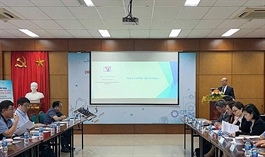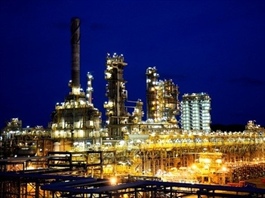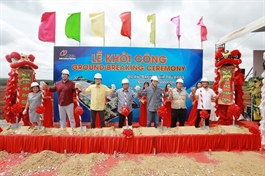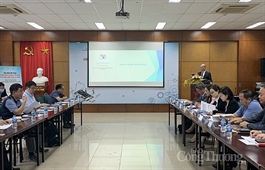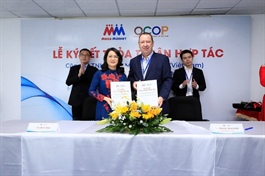Ample opportunities for EU and Vietnamese agri-food producers following EVFTA
Ample opportunities for EU and Vietnamese agri-food producers following EVFTA
The EU-Vietnam Free Trade Agreement (EVFTA) has opened up a wealth of opportunities for companies on both sides looking to profit from an already thriving trading partnership, particularly in the agri-food sector.
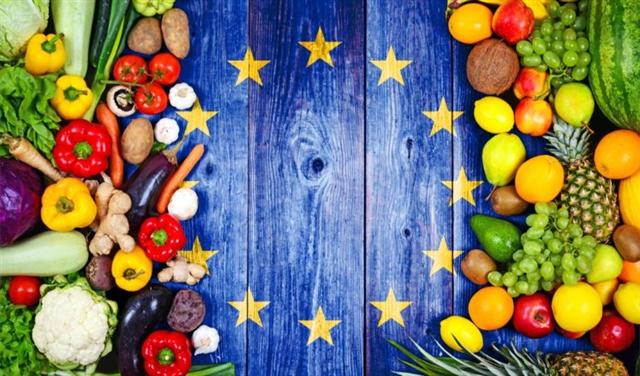
With the official implementation of the EVFTA, Vietnamese and EU producers have more opportunities in trade of agri-food products
|
This was stressed at a digital seminar on EU production standards for agri-food products held by the European Commission on October 8-9. The event was hosted by Giorgio Aliberti, EU Ambassador to Vietnam, with the participation of European experts in food safety and quality policy, as well as representatives from the Vietnamese authorities, EU food sector organisations, local importers, and retailers.
Vietnam is the EU's second-largest trade partner within ASEAN, after Singapore. Trade in goods totalled €45.5 billion ($53.83 billion) last year. The bloc’s main exports to Vietnam include electrical machinery and equipment, aircraft, vehicles, and pharmaceutical products. Meanwhile, Vietnam's main exports to the EU are electronic products, footwear, textiles, as well as coffee, rice, seafood, and furniture.
Under the EVFTA, 71 per cent of duties on imports from Vietnam were eliminated instantly with a further doing away of 99 per cent of all duties on goods within seven years. The agreement also ensures a level playing field. Vietnam has signed up to international standards, rules on animal and plant health and recognition of the "Made in EU" origin marking for most non-agricultural products.
With the official entry into force of the EVFTA, food (particularly the agri-food sector) could make big gains by exploring new growth markets. In 2019, the EU exported €1.1 billion ($1.3 billion) of agricultural food into Vietnam, with imports totalling €2.2 billion ($2.6 billion). It makes Vietnam the 29th destination for EU agri-food producers worldwide. Top agri-food exports into Vietnam include fresh and frozen meat, milk powders and whey, infant food, cereals, and flour.
Meanwhile, tea and coffee are the EU’s biggest import items from Vietnam, accounting for 47 per cent. Nuts, spices, and fruit make up 34 per cent. Many Vietnamese products currently benefit from trade preferences under the General Scheme of Preferences (GSP). It allows for some key products such as rice, mushrooms, or sugar to be imported into the EU with reduced or zero duties.
Food stafety plays an important role in boosting the exports of agri-food sector from Vietnam to the EU. According to the European Commission, the food and beverage industry is the EU's biggest manufacturing sector and in the last decade, exports have doubled to over €90 billion ($106.47 billion). EU quality standards for agricultural food and beverage products are world renowned – not just for their reputation but for adding value to the livelihood of farmers and rural communities. And right at the heart of the reputation is the European Commission's Food Safety policy which gives a high level of protection from farm to fork.
The four pillars of EU food safety cover:
- Food hygiene: from businesses to farms and restaurants. All must comply with EU food law, including those importing food into the EU.
- Animal health: ensuring sanitary controls and measures for pets, farmed animals, and wildlife. As well as monitoring and managing diseases by tracing the movement of all farm animals.
- Plant health: includes the detection and eradication of pests.
- Contaminants and residues: keeping contaminants away from food and animal feed.
EU protections work equally on goods entering the bloc. A key legislation to this aim is the Sanitary and Phyto-Sanitary (SPS) system for animal and plant agri-food products. Its role is to reduce or eliminate risks of animal, plant, and public health threats as well as animal and plant diseases being introduced into the EU by goods coming from non-EU countries. Controls also exist on certain imports of feed and food of non-animal origin.
Another key area is geographical indicators. The representative of the European Commission stated that, "Our citizens are at the heart of what we do. Protection of local food traditions and heritage must be respected by our partners. But we also aim to reciprocate what matters to you."
169 traditional European food and drinks products from a specific geographical origin will be protected against imitation on the Vietnamese market. This includes famous European delicacies such as Champagne, Parmigiano, Reggiano cheese, Rioja wine, and Feta cheese. Meanwhile, well-known Vietnamese products such as Mộc Châu tea or Buôn Ma Thuột coffee are given EU protection.
The digital seminar has attracted several EU and Vietnamese food producers. It was also a platform to discuss opportunities under the agreement on trade of agri-food products, an opportunity for many Vietnamese stakeholders to learn about and benefit from the EVFTA.
Day one of the event centred on the EVFTA and breakdown EU food safety standards. A big focus was on the EU Sanitary and Phyto-Sanitary (SPS) system for animal and plant agri-food products. It ensures that EU products are safe, traceable, and of high quality, a feature that is now passed onto Vietnamese consumers through the trade deal. Meanwhile, day two identified the key areas in food and beverage that could benefit from the EVFTA.




